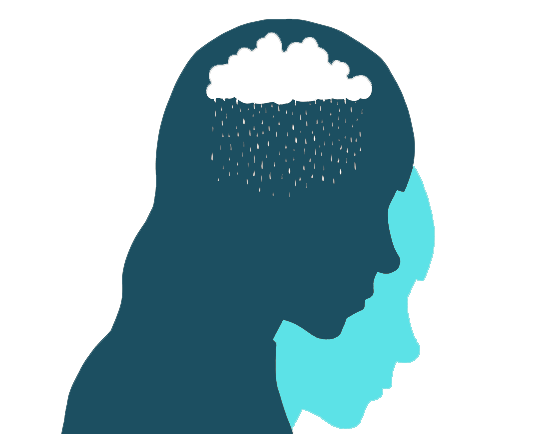
Prolonged sadness, apathy to things we used to love, decreased concentration, excessive tiredness, and the like can all be signs of depression. This disease changes our feelings, thoughts, and behaviors. Depression can be accompanied by emotional and physical problems. Depressive disorder is not a weakness that can be overcome with a few days of care, but long-term follow-up and treatment, continuous care and monitoring, but do not worry; we can all overcome depression. The sooner we treat depression, the easier it is to treat it and the more time we enjoy living. The first step in treating depression and preventing major depression recognizes the symptoms of depression.
Symptoms of depression
Knowing the symptoms of depression is very helpful in diagnosing depression in us and those around us. Here are 12 of the most important symptoms of depression :
- Feeling sad, empty and hopeless
- Going crazy and resentful of trivial issues
- Not being interested in doing things that used to be interesting to us.
- Sleep Disorders (sleep deprivation or oversleeping)
- Feeling tired or lacking in energy even without doing heavy work
- Severe changes in appetite and weight (increased or decreased appetite for no reason or sudden obesity and weight loss)
- Anxiety and restlessness
- The pangs of conscience or guilt for the small things of the past
- Decreased concentration, decreased problem-solving power
- Decreased decision-making ability
- Thinking of death and suicide
- Physical pain for no apparent reason
Causes of depression
Causes of Depression are :
Changes in chemicals in the brain
Certain substances in the brain affect human mood. Disruption of the balance of these chemicals in the brain is one of the most important causes of depression.
Genetics
Depression can be inherited; For example, if one of the identical twins becomes depressed, there is a 70% chance that the other will be affected.
Personality
: People with low self-confidence, those who do not know how to manage stress, or people who are generally pessimistic are more likely to be depressed.
Circumferential factors
: People who are exposed to violence, discrimination, abuse or poverty are more likely to develop depression. But the good news is that depression can be treated at any age and for any cause
Depression Treatment
There are severeal treatments for depression that we explain it below :
Treatment of depression with the help of medicine
The impaired balance of chemicals in the brain can be one of the causes of depression, so returning the concentration of these chemicals to normal can eliminate the state of depression. This balance is created by taking antidepressants. Contrary to popular belief, antidepressants are not sedative, hypnotic, stimulant, or addictive.
One to two weeks after taking antidepressants, their effect on the patient’s recovery is visible. The full effect of these pills can be seen from the second or third month. If depression is not completely cured after this period, your doctor may prescribe more medication or increase the dose.
After treating depression, especially severe depression, your doctor will usually ask you to continue taking the pill for 6 months or more. Because of the high risk of recurrence of depression and to prevent it, treatment may continue for a long time.
2- Treatment of depression by non-drug method
The psychiatrist may use psychotherapy, transcranial magnetic stimulation, and other methods to treat depression.
Physical symptoms of depression
symptoms of depression are :
Sleep problems in depression
Difficulty falling asleep or not being able to stay asleep (such as waking up in the early hours of the morning and not falling asleep again) that means morning depression is very common in people with depression.
Of course, a small number of people with depression also get too much sleep.
Chest pain in depression
Chest pain can be a sign of very serious problems such as heart disease and lung problems. Sometimes stomach problems are accompanied by chest pain. So if we feel pain in the chest, we must see a doctor determine the cause. Depression increases the risk of heart disease. It is interesting to note that this relationship is two-way, meaning that those who have experienced a heart attack or stroke are also more prone to depression.
Fatigue and lack of energy in depression
If after a long sleep or long rest we still feel tired and do not have the energy to do our simple tasks and daily tasks, it is better to consider the possibility of depression. When fatigue is added to the symptoms of depression, both look much worse and put the person with depression in a very difficult situation.
Gastrointestinal disorders in depression
It may be hard to believe, but the brain and intestines are so closely connected. Because of this, when we face stress or anxiety, we experience nausea or stomach pain.
Depression can affect our intestines and lead to nausea, indigestion, diarrhea, or constipation.
Headache
Reputable medical research shows that people with a major depression disorder are three times more likely to develop migraines. Unfortunately, people with migraines are five times more likely to develop depression.
Backache
If backache bothers us constantly, it may be due to depression.
People with depression are four times more likely to develop low back pain or severe headaches.
Exercise to help treat depression
In the brain of those who exercise regularly, some chemicals increase. These substances make a person:
- Make good sense
- Be less sensitive to pain
- Exercise does not cure depression alone, but it does help treat depression.
When we are depressed, we may feel that we do not have enough energy to exercise, defeat this thought, get up and exercise; Because mobility reduces the feeling of tiredness and improves sleep.
Conclusion
The pressures of today’s lifestyle can make anyone depressed. Knowing it requires high accuracy. Be careful about yourself and those around you. If we see symptoms of depression in ourselves, instead of denying or hiding it, identify and defeat depression by making simple habits such as exercise, healthy eating, going to a psychiatrist, and taking prescribed medications. A good mood and happy life are the right of all of us.


